Baptist Union Council: October 2025
Discussions about the formation of ministers and leaders Baptists Together, Baptist identity, and Christian nationalism and the Far Right took place at the latest gathering of Baptist Union Council.
Members of Council also reflected on what could be learnt from the closure of Spurgeon's College, and received an updates on the progress made to the Project Violet requests as well as on mission-focussed Baptist learning communities for 18-35s.
This took place alongside the welcoming of a new member church, voting on Key Roles nominations (including a new moderator for both Baptist Union Council and the Ministerial Recognition Committee), and a financial update.
It was held at the Yarnfield Conference Centre in Staffordshire from 21-22 October.
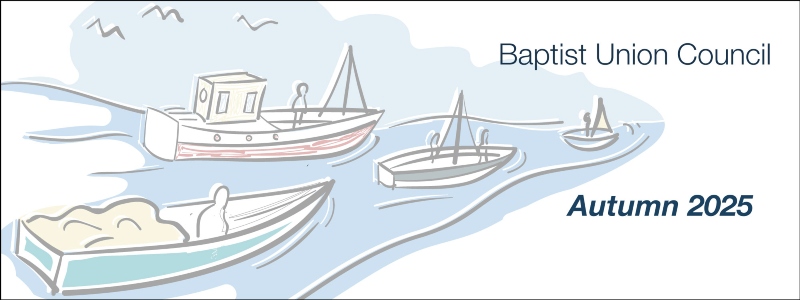
Scroll down for the following reports:
-
Worship and prayer
-
Formation of ministers and leaders - formation ecosystem update
-
Baptist identity
-
Christian nationalism and the Far Right
-
SENT cohort - a mission-focussed Baptist learning community for 18-35s
-
Project Violet Accountability Report
-
New member churches, closures, amalgamations
-
Persistent non-payers of subscriptions
-
Finance update
-
Key Roles Nominations
Worship and prayer
Baptist Union Council discerns the broad strategic direction of our Union, and the gathering was grounded in worship and prayer. It began with communion.
'It is really appropriate we meet around the Lord’s table,' said General Secretary Lynn Green. 'Christ is the centre and we worship and follow him. Let’s still our hearts and minds in God’s presence.'
To mark the 1700th anniversary of the Council of Nicaea and to stand in solidarity with the wider church, Lynn also invited Council members to say the Nicene Creed.
Tuesday evening saw an hour long session devoted to praying for peace in our time. There was a particular focus on Israel/Gaza, Russia/Ukraine, Sudan and the United Kingdom.
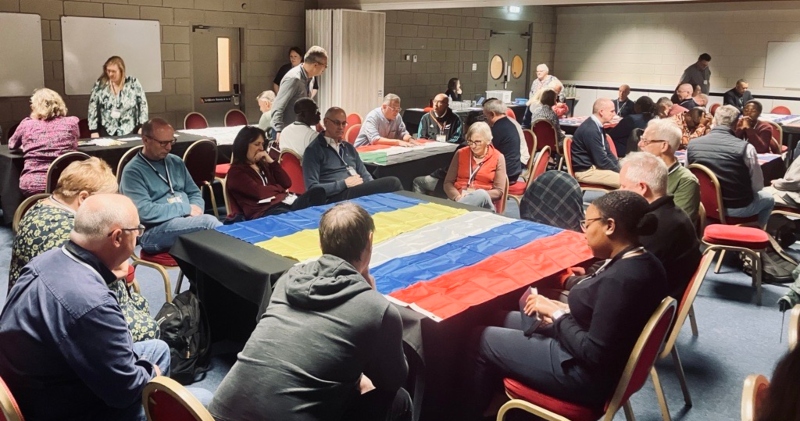
Worship was led by Zac Adeleye, Council member and minister of Serpentine Road Family Church in Wallasey, Merseyside.
Council was moderated this time by Peter King, moderator of the Baptist Union of Great Britain Trustee Board. Previous moderator Seidel Abel Boanerges had resigned from the role after relocating to Canada.
Seidel connected by video link at the end of the proceedings to receive an official farewell. Lynn thanked him for his calm leadership and all he had done both in the room and behind the scenes. She prayed for him and his family as he begins his new role at Acadia University in Canada.
Seidel expressed his thanks to Council members for the trust they had place in him, and for their partnership in the gospel. 'To serve in this shared calling has been one of the greatest privileges of my ministry,' he said.
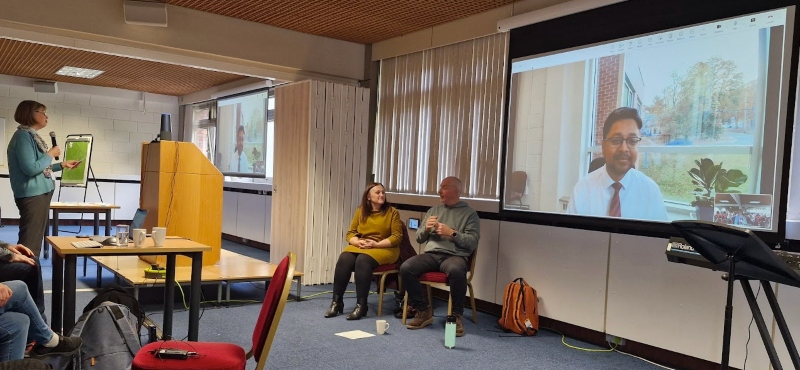
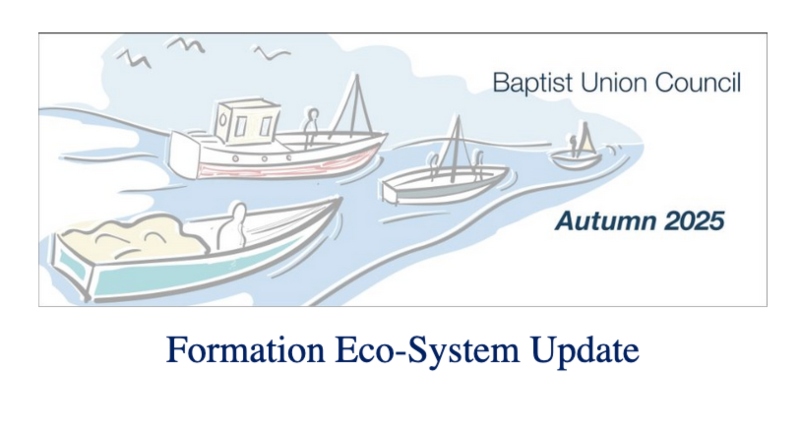 Formation of ministers and leaders - formation ecosystem update
Formation of ministers and leaders - formation ecosystem update
We want to foster a culture of life-long learning across Baptists Together - and to better achieve that our learning opportunities need to be more joined up and easily understood. That was the message from Ministries Team co-leader Tim Fergusson, as he gave an update to the ‘Formation Ecosystem’ vision he had shared at the last Council in March.
That previous Council saw Tim present a paper addressing the decline in the numbers entering ministry. He outlined a vision for a Baptist-specific ‘formation ecosystem’, consisting of a landscape of opportunities for learning and development, offered by associations, colleges, networks, training courses and placement churches working collaboratively.
‘A culture of a life-long formation should be part of who we are,’ Tim explained on Tuesday. However, the landscape is ‘mixed’ at present, and while there is much that is good, there is a ‘lack of coherence and connection’.
‘It becomes very difficult when we try to present learning opportunities to the wider Baptist family,’ Tim continued. ‘The variation in delivery is neither helpful nor equitable.’
In order to achieve a variety of opportunities that are ‘coherent, easily accessible, and understandable’, we need:
-
A greater willingness to adopt best practice
-
A commitment by each region to promote our primary formation pathways
-
A strong desire for non competitive partnership – something we’ve seen with collaborative working since the closure of Spurgeon’s
The briefing paper provided an update on what has happened since March. A Ministry Numbers Working Group (MNWG) has been formed.
The members of the MNWG are Lucy Wright, Rob May, Andrew Cowley, Claire Roberts, Lisa Kerry, Nathan McGuire, Tim Fergusson, Carl Smethurst, Anthony Clarke, Clare Hooper, Simon Jones, Peter Morden, Isabella Senior, Charmaine Howard, and Mike Fegredo.
The group’s work is mostly focussed on the early stages of a person’s formation journey. A number of subgroups have been formed to look at particular areas of development.
These are:
How we might provide a first point of contact and mentoring for anyone exploring a calling?; How we might ensure that clearly signposted local leader training, including a pathway to RLM status is available across all of Baptist Together?; how we might engage those who achieve RLM status with further development opportunities; how we might actively welcome and assess all those with prior learning and experience; how we might provide better supervision for those in training; how we might better advertise and promote our routes towards recognition and accreditation.
One option being explored is to use a legacy given for the purpose of supporting ministerial training to appoint learning leads working in or across Associations.
There is no proposal at this point to remove the requirement for accredited ministers to hold a university validated diploma or degree, or equivalent, in theology. 'We expect to continue to promote the college formation route as the most comprehensive and integrative way of preparing for a life of ministry,' the briefing paper stated.
Council members were invited to respond in plenary. Comments highlighted the importance of grassroots training, and for ministers to be alert in encouraging leadership opportunities for those in their midst.
‘This is a collective responsibility, a national priority,’ concluded Tim.
A ‘Discovering Ministry’ event takes place at the next Baptist Assembly.
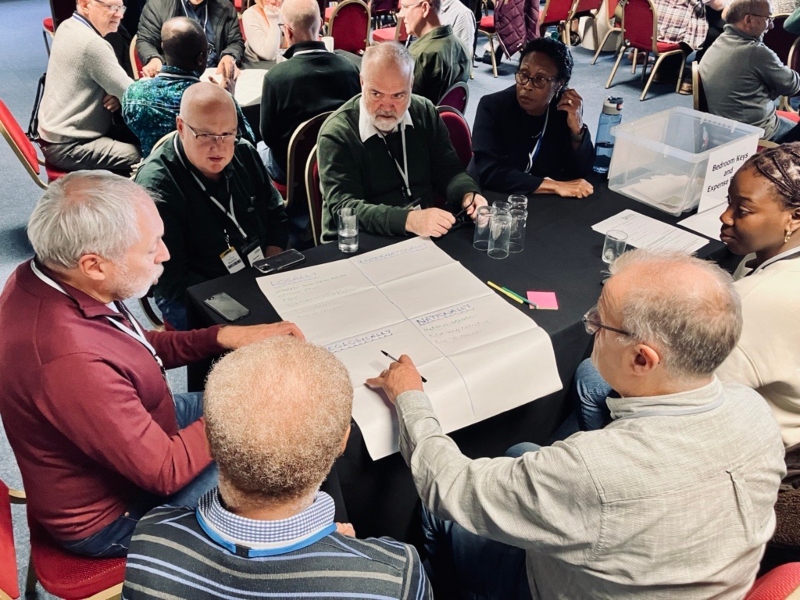
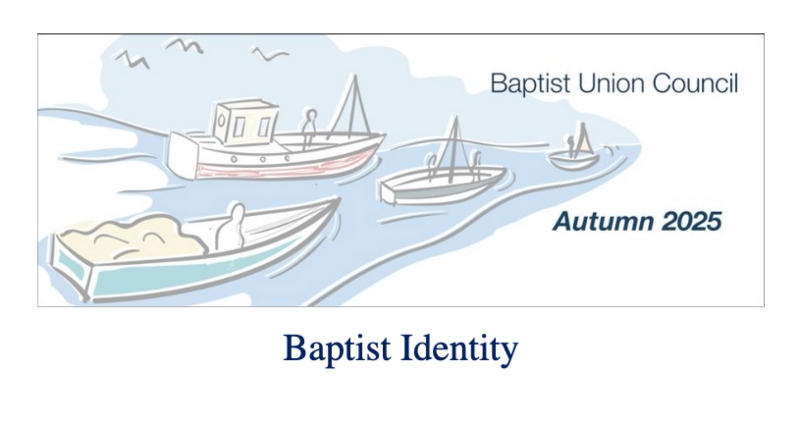 Baptist identity
Baptist identity
Baptist identity was explored during a session on Tuesday afternoon which was then extended into Wednesday morning. The aim was to seek members’ discernment ‘to understand Baptist identity in relation to mission and the local church’, explained Diane Watts, Faith and Society Team Leader, who led the session.
There were two aspects. The first involved receiving a theological paper titled ‘A Shared Understanding of British Baptist Identity’ for discussion and consideration. Members subsequently voted to commend the paper as a resource for Baptists Together. The paper will be added to the Baptists Together website in due course.
The second was to have some initial listening and discernment regarding a request from the Webnet trustees that the Baptist Union of Great Britain adopt the Baptist World Alliance Statement of Identity to sit alongside the Declaration of Principle. It was agreed by a small majority that a more in-depth conversation at a future Council was needed.
At the start of the session, members had been initially invited to respond with a one-word answer to the question:
Why/how is our Baptist dna important to you and to our shared mission across Baptists Together?
The results were displayed in a word cloud:
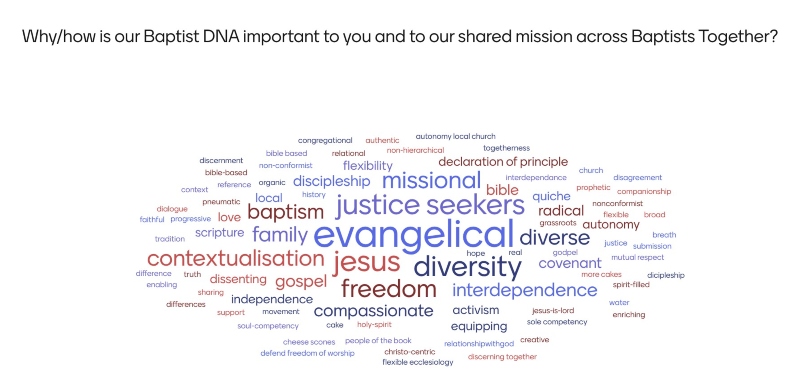
‘A Shared Understanding of British Baptist Identity’ – a theological paper
In recent years there had been some challenge about whether our Declaration of Principle is sufficient to hold Baptists together, Council members were told.
Into this context a group was established to 'explore the current concerns around Baptist identity and produce a longer and more substantial document that can discuss these issues with nuance and care,’ the briefing paper stated. 'The group was convened by Anthony Clarke and Andy Goodliff, under the auspices of the Centre for Baptist Studies at Regent’s Park College. It was an invited group deliberately reflecting the breadth of Baptist opinion, committed to considering a variety of issues of Baptist identity.'
Alongside Anthony and Andy, members of the group were: Beth Allison-Glenny; Steve Finamore; Julian Gotobed; Jeff Jacobson; Philip Lutterodt; Sally Nelson; Gale Richards; Diane Watts and Simon Woodman.
The paper had previously been offered to both the trustees and Core Leadership Team, and now Council members were invited to offer their reflections. This happened through conversations around tables, with broad themes then being shared in plenary.
There was a general resonance with the document, and while the absence of a section on covenant was noted, many stated it expressed something of our unity in diversity. There were questions on how it could be used, with some highlighting its length, and the use of the word British. The healthy process which enabled the paper to come together was highlighted, and could lessons be learnt from this?
Members were asked to vote on the following:
'Council thanks the contributors to the paper ‘A Shared Understanding of British Baptist Identity’ and commends it as a resource to Baptists Together.'
This was overwhelmingly carried.
Adopting the Baptist World Alliance Statement of Identity
Council members were told Webnet trustees had been in correspondence with the Baptist Union Trustees, the Core Leadership Team and the Council moderator asking if we could adopt the BWA Statement of Identity alongside the DoP. Because this was a request from a member body the Baptist Union Trustees invited Council to some initial listening and discernment about whether in principle we want to pursue this.
General Secretary Lynn Green was invited to share her own reflections on Baptist identity. She spoke of the Declaration of Principle as the basis of our Union which is rooted in The Great Commission from Matthew 28 and her belief that it creates a generous and gracious space for us all whilst also providing a foundation for our interdependence.
‘We are able to hold difference in tension because of our convictions about the local church which is “directly under the rule of Christ…”’ she added.
Around tables Council members were asked to discuss the consequences of adopting the BWA statement of Identity alongside the Declaration of Principle.
During this group time, concern was expressed about the process and so Andy Caldwell, the new Webnet Regional Minister Team Leader, was invited to share his thoughts instead of the planned plenary feedback.
‘We had hoped that we’d have had an opportunity to present why we think this is a really good thing,’ he said. ‘It is to coalesce, not to exclude people.’
As a result, space was created for an additional session which took place on the Wednesday morning. This included a brief presentation in support of the request from Peter Morden, Bristol Baptist College principal and a Webnet trustee, and conversation in plenary in which a wide range of heartfelt reflections were shared.
The themes from previous day’s reflections on the proposal were also shared (when Council members were invited to think about the consequences of adopting a statement of Baptist identity). These highlighted both positive and negative responses.
Positive feedback included: it would bring doctrinal clarity; alignment with international partners and help people understand who we are.
The negative responses highlighted whether this would be a denial of the Declaration of Principle; the impact it would have on our diversity; whether it would restrict freedom of the local church; the time, money and relational impact; and whether the process of adopting a statement would distract us from our main purpose of mission.
Following this, they were presented with the following question:
‘Does Council discern that a more in-depth conversation around the adoption of the BWA Statement of Identity to sit alongside the DoP be brought to a future Council?’
This was carried with a small majority.
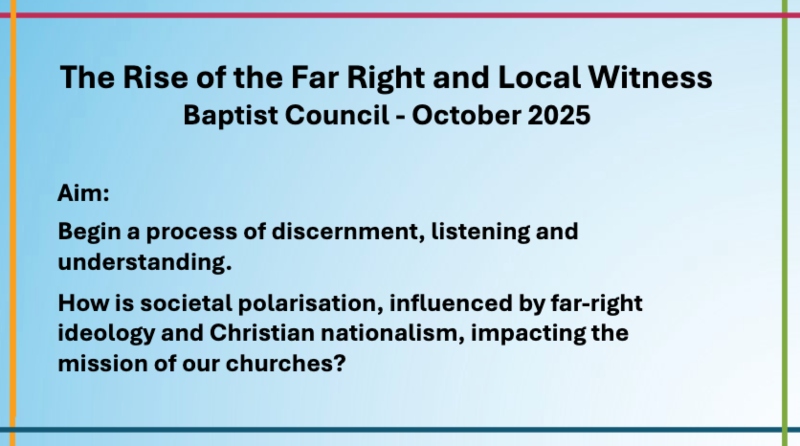 Christian nationalism and the Far Right
Christian nationalism and the Far Right
Council members reflected on how societal polarisation, influenced by far-right ideology and Christian nationalism, is impacting the mission of the local church.
The session was led by Public Issues Enabler Steve Tinning. Two videos were shown to highlight issues local Baptist church leaders have faced in this space.
The first featured an interview in Jaywick, Essex, the poorest ward in the country in which a local political figure and friend of Baptist ministers Sandra and Tony Crawford suggested that a sense of powerlessness and disenfranchisement in Jaywick had led to residents putting up the St George’s flag.
The second involved Wale Hudson-Roberts, the Baptists Together Justice Enabler. Wale is the part-time pastor of John Bunyan Baptist Church in Cowley, Oxford, and he shared how both he, and members of his congregation, had experienced an increase in racist abuse in recent months, including physical assaults.
Steve subsequently highlighted the stories of two Baptist churches who are responding to asylum seekers and immigrants with love and compassion. Both churches had experienced profound gratitude from the asylum seekers and from others in the community grateful for their compassionate approach, but both, in different ways, had experienced some local hostility too.
Steve also highlighted national statements in response to the recent Unite the Kingdom rally. These statements expressed deep concern about the rally and the visible co-option of Christian symbolism. The statements were supported by Christians leaders, including Lynn Green, from a wide variety of racial, denominational and theological backgrounds.
Members were invited to reflect on what they are noticing and hearing in their contexts, and were asked to consider the following questions:
-
What’s the impact of (online) media and social media?
-
Are we comfortable with the call for Britain to be a Christian nation?
-
How can we walk together as Baptists to support each other in mission at this time?
-
What does discipleship look like in our context?
There was a broad acknowledgment of significant concerns in local communities as more stories were shared. Comments included a recognition that those with trans-local ministry should be talking more about this and encouraging our churches to do the same.
Council members were also invited to share passages and verses that are important to bring into the conversation.
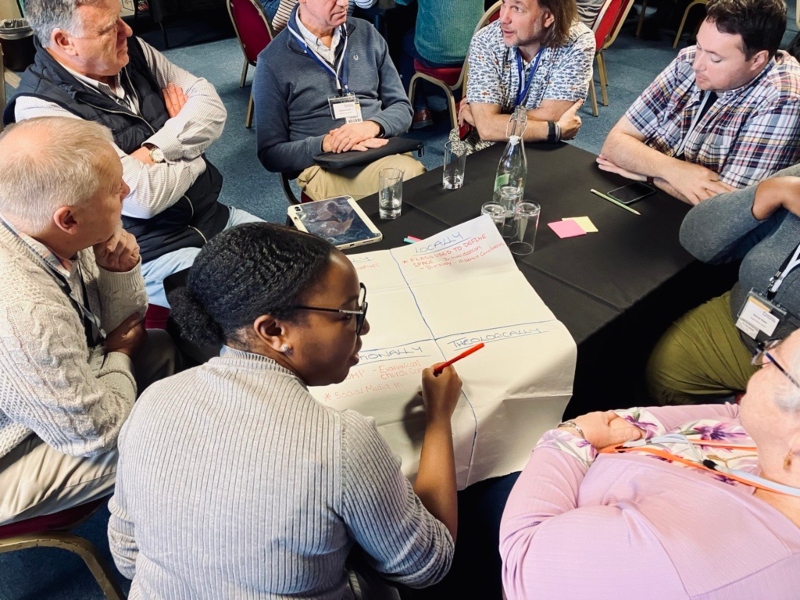
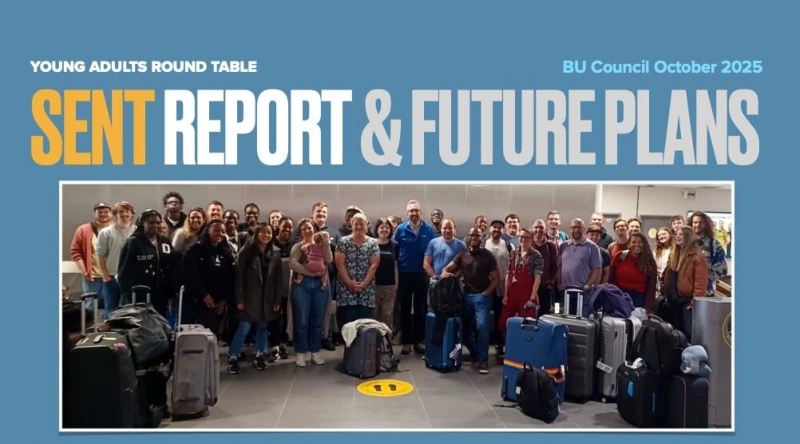 SENT cohort - a mission-focussed Baptist learning community for 18-35s
SENT cohort - a mission-focussed Baptist learning community for 18-35s
The final session of Council was devoted to a report about a three-year mission-focussed Baptist learning community for 18-35s - the SENT cohort - and plans for the next such community.
The session was presented by Jonny Hirst, a regional minister in the North Western Baptist Association and member of the core group of the Baptists Together Young Adults Round Table (YART).
The cohort was created with the SENT mission conference organised by the European Baptist Federation in Norway in July 2023. Thirty-one UK participants aged 18-35 signed up and were joined by nine accompaniers. The conference heralded the beginning of a three-year learning community for the group.
The community met a couple of times onsite and online each year and received support and encouragement from the accompaniers, who were experienced leaders. The aim was to ‘encourage and support Baptist missional 18-35s to reflect theologically and grow as missional leaders, as well as to bring the voice of 18-35s into conversations about the mission strategy of Baptists Together,’ Jonny’s briefing paper explained.
The paper and subsequent presentation went into more detail about the challenges, lessons learned and the benefits and fruits of the learning community.
Through this we have gained a national network of 18-35s, Jonny told Council members (20 out of the 31 have remained engaged throughout the process). They are a resourced group of young adults who are discerning their calling; (‘Individuals really grew and gained more clarity in their calling either in their church or workplace roles. They positively spoke out and shared testimonies of mission and stepping out into new roles; a couple of individuals discerned calling to recognised and accredited ministry.)
The community has contributed to the ‘growing momentum’ of young adults: Jonny highlighted the wider picture, referencing the Quiet Revival report and other evidence suggesting more young adults (Gen Z) and under 18s (Gen Alpha) are believing in God. The recent North Western Baptist Association youth weekend for 11-16s (Impact) had more than 100 participants and ‘was booked up far earlier than I’d ever known,’said Jonny.
With all this in mind, Jonny outlined how YART is working towards the creation of a new learning community for 18-35s to begin in 2026.
This new learning community will run for 18 months and there will be an application process for those interested (a model inspired by ‘Magnify You’). The process will require nominations and support from associations and local churches to suggest and help fund individuals.
Jonny stressed how funding was crucial to the SENT cohort: both the participation at the SENT conference and the subsequent learning community were funded by partners across Baptists Together.
‘The financial support from different streams made the SENT cohort and learning community a reality and success,’ he said.
‘Therefore, it is crucial that we find the same level of investment in this new learning community. We hope to continually invest in future learning communities that will engage, connect and equip the next generation of leaders for our Baptist movement.’
He spoke of the importance of creating new networks for young adults to be part of, and highlighted the Explore your Calling event at the Baptist Assembly, and the March4Mission programme recently established by BMS World Mission.
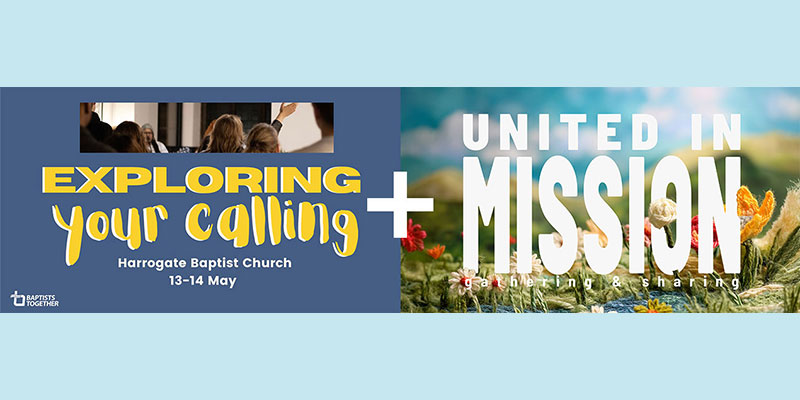
Space was given in plenary for Council members to share their own reflections and experiences, and several told encouraging stories. One common theme to emerge was the need for discipleship among these younger generations.
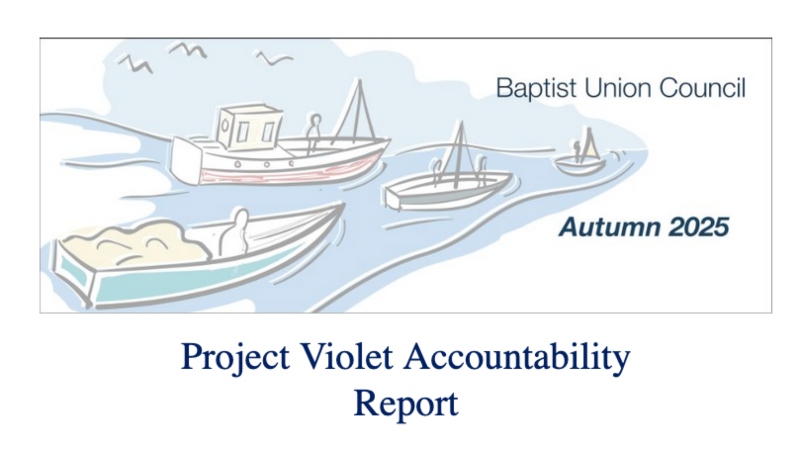 Project Violet Accountability Report
Project Violet Accountability Report
An update on the progress made to all the requests for change to emerge from Project Violet was shared at Council.
Project Violet undertook research on women’s experience of Baptist ministry between 2021 and 2024. The findings were released in May 2024 and included 57 requests for change.
In October 2024 Baptist Union Council endorsed the commitments to action made by stakeholders across Baptist life, and agreed to an accountability report to be presented to Council one year later 21 October 2025, celebrating the progress made and asking what more remains to be done.
The report was presented by Samantha Bowring, the Project Violet Outcome Co-ordinator. Samantha is based in the Ministries Team. The focus of her two-year role is on the policies and practices of the Specialist Teams, and to coordinate and inform people about good practice across Baptists Together.
She shared several themes. There has been ‘an enthusiastic response’ across Baptists Together to the requests from Project Violet.
'A growing awareness of the need to support women in ministry, coupled with a deepening commitment to justice, has led to a wealth of good practice already in place — practice we can celebrate and build upon,’ her report stated. 'Council should be encouraged by the momentum and progress to date.’
However, while the journey has begun well, there remains ‘significant ground’ to cover - and 'it’s just as important to know where we’re stuck’, said Samantha, so we can overcome the obstacles.
She has encountered several difficulties in responding to the requests, with the primary barriers relating to limited resources—financial, staffing, and expertise.
While all Associations have made progress, this has been in different areas. In several cases, 'someone somewhere has made progress and found creative solutions', Samantha continued, and this diversity 'presents a valuable opportunity for shared learning.'
To support this, a day has been organised on 12 January, 2026 for Project Violet Leads or Regional Ministers to come together, share insights, and plan next steps.
There will also be occasional newsletters to highlight good practice and share resources across Associations.
She invited Council members to have roundtable discussions on the following questions:
-
Should we reiterate the call for male ministers to be allies?
-
When is it useful to have women only space and events?
-
How well did Baptists Together engage with lament?
-
Is the social context for women already different to when Project Violet began?
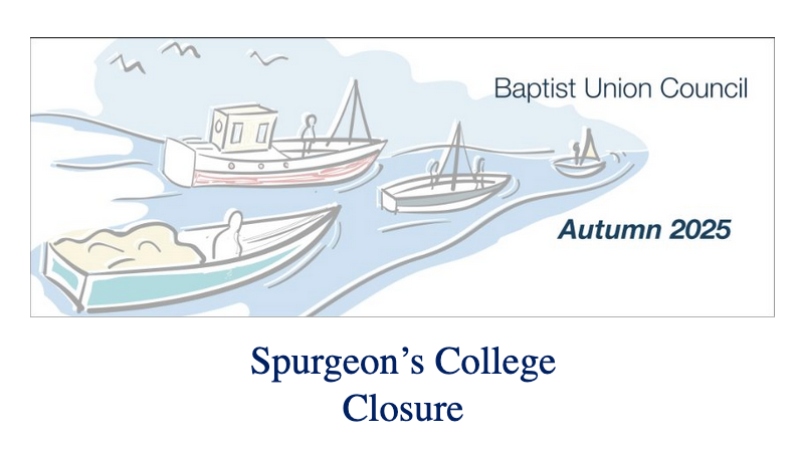 Closure of Spurgeon’s College
Closure of Spurgeon’s College
Council members were invited to reflect on what we need to learn from the closure of Spurgeon’s College. The session was led by Ministries Team co-leader Tim Fergusson.
Tim explained that September’s meeting of the Core Leadership Team had involved capturing people’s feelings at the closure, including: sadness, shock, anger, shame, embarrassment.
Before opening the Council plenary discussion, he said the majority of Baptist students affected by the sudden closure now have provision arranged for the new academic year. ‘I can’t express enough my thanks for those who stepped up,’ he said.
Furthermore, and to applause, he shared that the appeal to support the affected students had raised £69,000 to date.
Several members spoke to share their reflections. Themes to emerge encompassed how we hold our mutual accountability and the impact on our culture; how we honour both our legal and spiritual commitment together; transparency and due diligence.
Several comments focused on the future; Do we need to reimagine ministerial formation? What new opportunities of teaching and formation are before us?
New member churches, closures and amalgamations
One church which has joined our Union since the previous Council was welcomed and prayed for, while members were also informed of nine church closures, one church ceasing membership of BUGB, and two amalgamations. There were also two church name changes.
New member churches
The one church to have joined our Union since the last Council is Harold Park Baptist Church in Romford, Essex.
David Mayne, Regional Minister Team Leader of Eastern Baptist Association, explained how the church had returned to the Union after having left in the 1950s. Until recently it had been a member of the Fellowship of Independent Evangelical Churches, but a change of leadership and a desire to associate and ‘to be part of a Union that explicitly affirms the leadership of women’ had led to it becoming a member again.
‘They are joining us with real energy and enthusiasm, not because they have to,’ said David.
The church has shared the following video:
Sorry, your browser is unable to play this type of file.
You can still
download it
Closures
Nine closures were announced:
-
Bromley Common Baptist Church (LB)
-
East Leake Baptist Church (EMBA)
-
Taffs Well LEP (SWaBA)
-
Queensbury Baptist Church (YBA)
-
Fleet Baptist Church (EMBA)
-
Langley Mill Baptist Church (EMBA)
-
Emmanuel Baptist Church Rhymney (SWaBA)
-
Ushaw Moor Baptist Church (NBA)
-
Openshaw Connection (NWBA)
One church also ceased membership of BUGB: Bethel Central Church, Maesteg (SWaBA)
Amalgamations
Two amalgamations were shared:
-
Derby Urban Church and Boulton Lane have amalgamated to form Derby Urban Church (EMBA)
-
Wellington Square Baptist Church and St Leonards on Sea Baptist Church have amalgamated to form Hastings & St Leonards on Sea Baptist Church (SEBA)
Church name changes
There were also two church name changes:
-
Hither Green Baptist Church to HGBCHURCH CIO
-
Highfield Road Baptist Church to Dartford Baptist Church
College news
Northern Baptist College and Northern College merged into Luther King House Educational Trust at the beginning of 2025.
Council members were told that while there has been a name change, the college remains Baptist and has the Declaration of Principle at its core.
There are on-going conversations regarding Scottish Baptist College’s membership of the Baptist Union in the light of the criteria for member colleges set by Council in 2023.
Spurgeon’s College and North Wales Baptist College are in the process of closure and will cease to be member colleges.
Persistent non-payers of subscriptions
Council considered a list of persistent non-payers of Baptist Union subscriptions - churches which have not paid their BUGB subscription for at least three years.
As per the BUGB CIO constitution, the name of any Church, Association or College whose subscription is more than one year in arrears shall be reported to Council, which may determine its membership.
This last happened in March 2019, when a list of 45 churches which had not paid a subscription for three years was presented to Council. After discussion with Associations, and the Baptist Union of Wales, 10 churches were subsequently removed from the list of members of the Baptist Union of Great Britain.
This time 13 churches were presented - churches who have consistently not paid their BUGB subscription for at least three years, and where we have not been given any information as to why this might be the case.
Simeon Baker explained how eight of the churches in the list are in relationship with the Baptist Union of Wales (or in other Associations). Some had joint membership for historical reasons, and conversations have taken place with the regional team.
Council members were asked to decide whether and how the process of removal is managed.
Members voted overwhelmingly to follow the proposed recommendation:
-
Each church will be contacted with the request that they pay their outstanding subscriptions by 31 December 2025 and commits to ongoing payment of subscriptions.
-
If no response (or a negative response) is received by that date, the church will be removed from BUGB membership and this will be reported to Council in March 2026.
-
As membership of Union and Associations is now a single process, relevant Associations will also be asked to remove these churches from their membership lists.
 Financial update
Financial update
Treasurer Mohan Pandian and Support Services Team Leader Chris Jones presented a financial update.
Our financial situation continues to decline. One reason is the impact of the Family Solution Loan (FSL), which was a ‘superb solution’ resolving a Pension Regulator issue on the deficit in the Defined Benefit Pension Scheme, noted Chris. The FSL is an intercompany loan between Baptist Union Corporation (BUC) and BUGB, with RBMHO’s property portfolio providing security. The key benefits were bringing the problem in-house, removing the liability risk, and protecting churches.
However. rising interest rates since 2021 have removed the cost neutrality of the loan. Furthermore, the anticipated mechanism for paying off the loan – the sale of surplus RBMHO properties – has not materialised, due to demand for RBMHO housing not diminishing as previously anticipated.
Chris explained that in March 2025, BUGB Trustees agreed not to change the way BUC surplus was allocated during 2025 to ensure Associations did not receive a mid-year financial shock. This was explained to Council in March.
However, in 2025, after receipts from BUC, BUGB still anticipates a level of loss BUGB cannot sustain. Therefore, in September BUGB Trustees agreed to change how the BUC surplus is allocated. From January 2026 the cost of the FSL will be covered, up to in its entirety, by BUC surplus. Any remaining BUC surplus will go into the Common Purse. Unfortunately, there we are not expecting any remaining BUC surplus.
Home Mission income has been broadly consistent with forecasts, said Mohan. However each year the forecasts have steadily decreased – this year’s forecast is 8.9 per cent lower than the 2024 equivalent. The final months of the year are always critical, and Council members were encouraged to do all they can to promote Home Mission giving.
Chris gave an update on the Financial Model Review, which remains on track to us transitioning to a new way of working in 2027.
The legacies promotion is now in the public domain. A group of RMTLs have been working together to look at Home Mission communications to increase giving. Jane Henderson of the North Western Baptist Association is one, and shared an update.
Few churches give the recommended five per cent of their budget to Home Mission. Anecdotally they don’t fully understand where the money goes, Jane said. But they are giving, just not to Baptists. Therefore, a 'clear, concise, shared vision' is needed. If all churches gave five per cent, we would more than double our income.
In the short term, as treasurers create budgets for 2026, churches will be asked to give an extra one per cent of their budget to Home Mission.
Jane said, ‘We’ll be asking: Could you put in one per cent more than what you’re doing? And then do the same next year?
‘It’s all part of the message: look at the value you get from Baptists Together, but also look at the mission your generosity funds. We want to encourage our churches to be generous to Baptists Together.’
Key Roles Nominations
Council members voted to approve nominations for both the new moderator of Council - the Revd Rob May - and of the Ministerial Recognition Committee - the Revd Carol Bostridge.
They had been brought by the Baptists Together Key Roles Nominations Team, whose own moderator Barbara Carpenter presented a report.
She reminded members that following the adoption of our Governance Report in 2012, Council would be ‘the body that is representative of the churches through their Associations and Colleges and where the full diversity of the denomination can and should be fully expressed’.
The Key Roles Nominations Team is intentional in its consideration of diversity in Council among other things, as it goes about its work of discerning those called to key leadership roles.
Moderator of BUGB Council
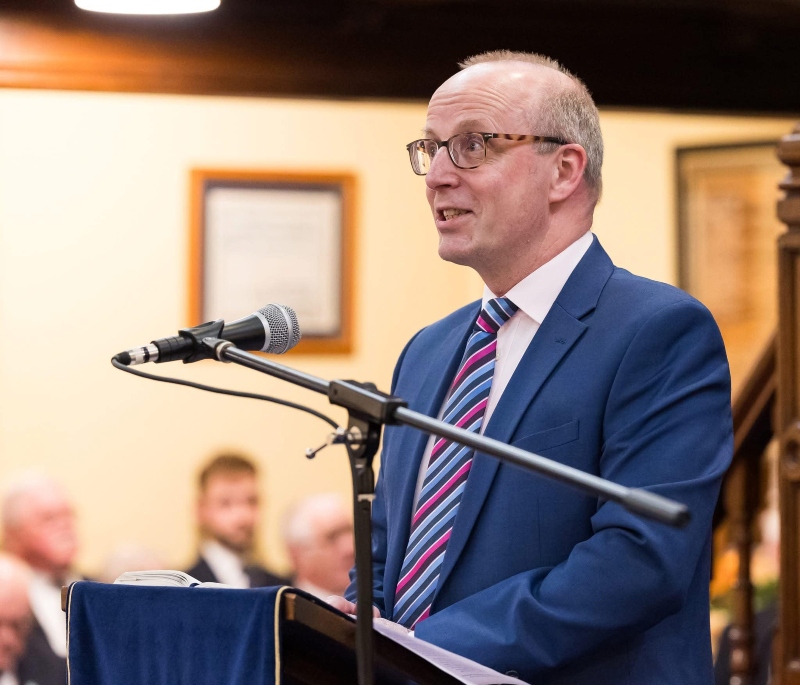 Council members voted to approve the recommendation of the Revd Rob May as the new Council moderator. The position had become vacant following the resignation of previous moderator Seidel Abel Boanerges, who has relocated to Canada.
Council members voted to approve the recommendation of the Revd Rob May as the new Council moderator. The position had become vacant following the resignation of previous moderator Seidel Abel Boanerges, who has relocated to Canada.
Three people expressed an interest in the role, and the Key Roles Team met all three at a discernment day in September.
After prayerful reflection, it recommended Rob for the role.
Rob is a regional minister with the South Wales Baptist Association, having joined in 2023, and has been a Baptist minister for 27 years. He has served the denomination in a number of ways, including Association Ministerial Recognition Committees (as member, chair, and vice-moderator), mentoring Newly Accredited Ministers and supervising placements for Spurgeon’s College.
He said, 'We face significant challenges in the years ahead, yet we also see clear signs of God’s faithfulness and creativity among us. My hope and vision for Council is that we will embody collaborative, spiritually grounded, and relational leadership. That we would draw on the breadth and rich diversity of our Union, listening to every voice - especially the often marginalised - seeking God’s will together with wisdom, humility, and love.
'Council should demonstrate theological depth, pastoral care, and sound governance, offering faithful discernment and strategic guidance for our shared mission as a Baptist family.
'I therefore see the Moderator’s role to be a calm, listening, pastoral, and collaborative presence — someone who helps create space that draws people together, fosters honesty and courage tempered by grace in moments of challenge, and remains open to the Spirit’s leading as we shape our common life together. Not someone who imposes their own agenda but instead models the qualities of Council at its best.'
Moderator of Ministerial Recognition Committee
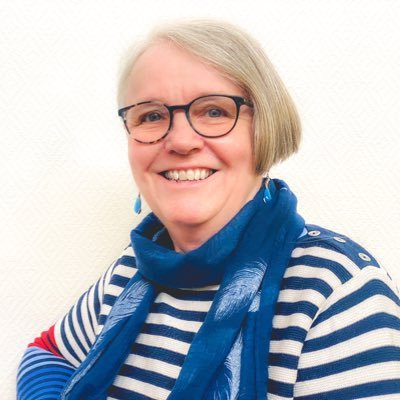 The nomination of the Revd Carol Bostridge to the role was approved by Council members. The role became vacant following the resignation of previous incumbent the Revd Susan Stevenson.
The nomination of the Revd Carol Bostridge to the role was approved by Council members. The role became vacant following the resignation of previous incumbent the Revd Susan Stevenson.
Carol is a retired Baptist minister. She served as minister of Crofton Park Baptist Church for 14 years and as a District
Minister in South East London. Following a time spent leading Lewisham Foodbank and Lewisham Pastors, she then served as a regional minister in London for six years.
Since retiring in 2023 she had prayerfully considered how she could continue to serve the Baptist family. She has done this in a number of ways, including assisting with Ministerial Recognition Committees (MRC), both in London and nationally.
BUGB Trustees
There remains a vacancy for a Trustee with financial experience and expertise. We have been looking to fill this role for some time now. While there was some interest expressed in the summer, the Team has not had anyone who is feeling sufficiently called to discuss it further.
Andrew Cowley’s term of service as a Trustee comes to an end in December 2025, and he will not be standing for further terms. Andrew had served as moderator of the Trustee Board.
'We thank him for all his work as a Trustee, and especially for his time as Moderator of the Trustee Board,' noted Barbara.
We are therefore be seeking a further Trustee to replace Andrew. Council members were asked to hold this position in their prayers and to encourage those who they may feel led to approach to make contact with the team.
Members were also informed the Revd Dr Philip McCormack, the former principal of Spurgeon’s College, had resigned as a BUGB trustee.
Co-options to BUGB Council
The second terms of service for Susan Myatt and Raphael Amoaka-Atta as Co-opted members of Council ends in November 2025. Both are happy to continue, and the Key Roles team recommended that Susan and Raphael serve for a further term. Both recommendations were approved.
As part of their discussions the team became aware that there is no maximum term of service laid out for Council co-optees.
'We felt that in order to honour Council’s intention in creating co-opted spaces as places for under-represented groups to be present at Council, that it would be helpful if co-optees served a maximum of three terms.
The Key Roles Nominations Team therefore recommended that Council co-optees serve for a maximum of three terms. Members approved the recommendation.
Baptist Times, 04/11/2025